Related Research Articles

Global warming potential (GWP) is an index to measure of how much infrared thermal radiation a greenhouse gas would absorb over a given time frame after it has been added to the atmosphere. The GWP makes different greenhouse gases comparable with regards to their "effectiveness in causing radiative forcing". It is expressed as a multiple of the radiation that would be absorbed by the same mass of added carbon dioxide, which is taken as a reference gas. Therefore, the GWP is one for CO2. For other gases it depends on how strongly the gas absorbs infrared thermal radiation, how quickly the gas leaves the atmosphere, and the time frame being considered.
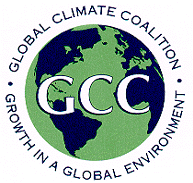
The Global Climate Coalition (GCC) (1989–2001) was an international lobbyist group of businesses that opposed action to reduce greenhouse gas emissions and engaged in climate change denial, publicly challenging the science behind global warming. The GCC was the largest industry group active in climate policy and the most prominent industry advocate in international climate negotiations. The GCC was involved in opposition to the Kyoto Protocol, and played a role in blocking ratification by the United States. The coalition knew it could not deny the scientific consensus, but sought to sow doubt over the scientific consensus on climate change and create manufactured controversy.
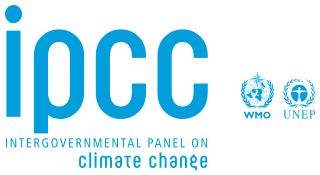
The Intergovernmental Panel on Climate Change (IPCC) is an intergovernmental body of the United Nations. Its job is to advance scientific knowledge about climate change caused by human activities. The World Meteorological Organization (WMO) and the United Nations Environment Programme (UNEP) established the IPCC in 1988. The United Nations endorsed the creation of the IPCC later that year. It has a secretariat in Geneva, Switzerland, hosted by the WMO. It has 195 member states who govern the IPCC. The member states elect a bureau of scientists to serve through an assessment cycle. A cycle is usually six to seven years. The bureau selects experts to prepare IPCC reports. It draws the experts from nominations by governments and observer organizations. The IPCC has three working groups and a task force, which carry out its scientific work.

The Kyoto Protocol (Japanese: 京都議定書, Hepburn: Kyōto Giteisho) was an international treaty which extended the 1992 United Nations Framework Convention on Climate Change (UNFCCC) that commits state parties to reduce greenhouse gas emissions, based on the scientific consensus that global warming is occurring and that human-made CO2 emissions are driving it. The Kyoto Protocol was adopted in Kyoto, Japan, on 11 December 1997 and entered into force on 16 February 2005. There were 192 parties (Canada withdrew from the protocol, effective December 2012) to the Protocol in 2020.

The Montreal Protocol is an international treaty designed to protect the ozone layer by phasing out the production of numerous substances that are responsible for ozone depletion. It was agreed on 16 September 1987, and entered into force on 1 January 1989. Since then, it has undergone nine revisions, in 1990 (London), 1991 (Nairobi), 1992 (Copenhagen), 1993 (Bangkok), 1995 (Vienna), 1997 (Montreal), 1998 (Australia), 1999 (Beijing) and 2016 (Kigali) As a result of the international agreement, the ozone hole in Antarctica is slowly recovering. Climate projections indicate that the ozone layer will return to 1980 levels between 2040 and 2066. Due to its widespread adoption and implementation, it has been hailed as an example of successful international co-operation. Former UN Secretary-General Kofi Annan stated that "perhaps the single most successful international agreement to date has been the Montreal Protocol". In comparison, effective burden-sharing and solution proposals mitigating regional conflicts of interest have been among the success factors for the ozone depletion challenge, where global regulation based on the Kyoto Protocol has failed to do so. In this case of the ozone depletion challenge, there was global regulation already being installed before a scientific consensus was established. Also, overall public opinion was convinced of possible imminent risks.
The United Nations Framework Convention on Climate Change (UNFCCC) is an international treaty among countries to combat "dangerous human interference with the climate system", in part by stabilizing greenhouse gas concentrations in the atmosphere. It was signed in 1992 by 154 states at the United Nations Conference on Environment and Development (UNCED), informally known as the Earth Summit, held in Rio de Janeiro. Its secretariat was in Geneva at first but relocated to Bonn in 1996. The treaty entered into force on 21 March 1994. "UNFCCC" is also the name of the Secretariat charged with supporting the operation of the convention, with offices on the UN Campus in Bonn, Germany.
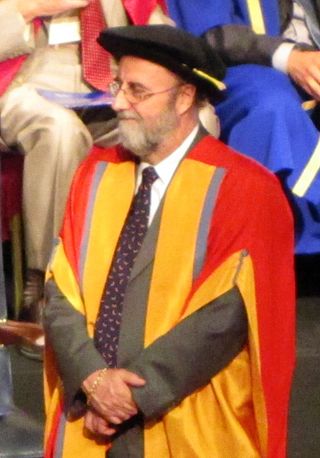
Sir Robert Tony Watson CMG FRS is a British chemist who has worked on atmospheric science issues including ozone depletion, global warming and paleoclimatology since the 1980s. Most recently, he is lead author of the February 2021 U.N. report Making Peace with Nature.

The Global Environment Facility (GEF) is a multilateral environmental fund that provides grants and blended finance for projects related to biodiversity, climate change, international waters, land degradation, persistent organic pollutants (POPs), mercury, sustainable forest management, food security, and sustainable cities in developing countries. It is the largest source of multilateral funding for biodiversity globally, and distributes more than $1 billion a year on average to address inter-related environmental challenges.
The World Climate Change Conference was held in Moscow from September 29 to October 3, 2003. The initiative of convening the Conference was taken by Vladimir Putin, the President of the Russian Federation. The Conference was convened by the Russian Federation, and supported by international bodies including the United Nations. It should not be confused with the World Climate Conferences.
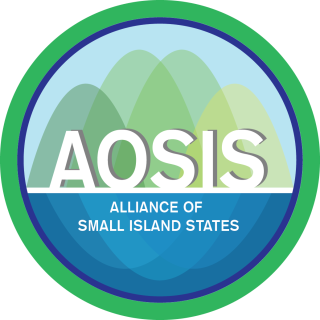
Alliance of Small Island States (AOSIS) is an intergovernmental organization of low-lying coastal and small island countries. AOSIS was established in 1990, ahead of the Second World Climate Conference. The main purpose of the alliance is to consolidate the voices of Small Island Developing States (SIDS) to address global warming.

The Global Atmosphere Watch (GAW) is a worldwide system established by the World Meteorological Organization – a United Nations agency – to monitor trends in the Earth's atmosphere. It arose out of concerns for the state of the atmosphere in the 1960s.
Friends of Science(FoS) is a non-profit advocacy organization based in Calgary, Alberta, Canada. The organization rejects the established scientific consensus that humans are largely responsible for the currently observed global warming. Rather, they propose that "the Sun is the main direct and indirect driver of climate change," not human activity. They argued against the Kyoto Protocol. The society was founded in 2002 and launched its website in October of that year. They are largely funded by the fossil fuel industry.
Pier Vellinga is an environmental scientist and one of the Netherlands' experts on the impacts of climate change.
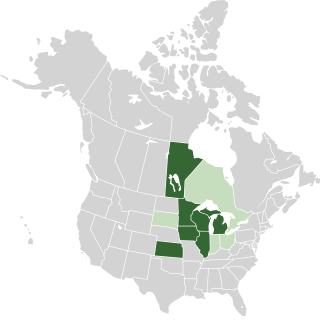
The Midwestern Greenhouse Gas Reduction Accord was a regional agreement by six governors of states in the US Midwest who are members of the Midwestern Governors Association (MGA), and the premier of one Canadian province, whose purpose is to reduce greenhouse gas emissions to combat climate change. The accord has been inactive since March 2010, when an advisory group presented a plan for action to the association with a scheduled implementation date of January 2012. Signatories to the accord are the U.S. states of Minnesota, Wisconsin, Illinois, Iowa, Michigan, Kansas, and the Canadian Province of Manitoba. Observers of the accord are Indiana, Ohio, and South Dakota, as well as the Canadian Province of Ontario.

The 2008 United Nations Climate Change Conference took place at PIF Congress Centre, Poznań International Fair (PIF), in Poznań, Poland, between December 1 and December 12, 2008. Representatives from over 180 countries attended along with observers from intergovernmental and nongovernmental organizations.
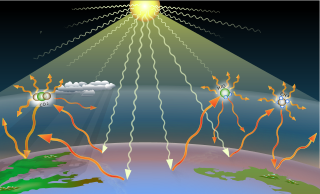
Greenhouse gases are the gases in the atmosphere that raise the surface temperature of planets such as the Earth. What distinguishes them from other gases is that they absorb the wavelengths of radiation that a planet emits, resulting in the greenhouse effect. The Earth is warmed by sunlight, causing its surface to radiate heat, which is then mostly absorbed by greenhouse gases. Without greenhouse gases in the atmosphere, the average temperature of Earth's surface would be about −18 °C (0 °F), rather than the present average of 15 °C (59 °F).

Tan Sri Zakri bin Abdul Hamid has had a distinguished career in science as a researcher, educator, administrator and diplomat.

The Under2 Coalition is a coalition of subnational governments that aims to achieve greenhouse gases emissions mitigation. It started as a memorandum of understanding, which was signed by twelve founding jurisdictions on May 19, 2015 in Sacramento, California. Although it was originally called the Under2 MOU, it became known as the Under2 Coalition in 2017. As of October 2022, the list of signatories had grown to 270 governments which represented over 1.75 billion people and 50% of the world economy. The Under2 MOU was conceived through a partnership between the governments of California and Baden-Wurttemberg, with The Climate Group acting as secretariat.
The history of climate change policy and politics refers to the continuing history of political actions, policies, trends, controversies and activist efforts as they pertain to the issue of climate change. Climate change emerged as a political issue in the 1970s, where activist and formal efforts were taken to ensure environmental crises were addressed on a global scale. International policy regarding climate change has focused on cooperation and the establishment of international guidelines to address global warming. The United Nations Framework Convention on Climate Change (UNFCCC) is a largely accepted international agreement that has continuously developed to meet new challenges. Domestic policy on climate change has focused on both establishing internal measures to reduce greenhouse gas emissions and incorporating international guidelines into domestic law.

David Edward Reichle is an American ecologist who worked at the Oak Ridge National Laboratory (ORNL) and is known for his pioneering research on the movement of radionuclides in the environment and the carbon metabolism of forest ecosystems. From 1967 to 1981 he was co-chair of Woodlands for the International Biological Programme. He served as Director of ORNL’s Environmental Sciences Division (1986-1990) and retired in 2000 as Associate Director of the Oak Ridge National Laboratory. His advanced text, The Global Carbon Cycle and Climate Change: scaling ecological energetics from the organism to the biosphere, 1st edition was published in 2020. A second edition was published in 2023.
References
- ↑ Potter, Thomas D. (Winter 1986). "Advisory Group on Greenhouse Gases Established Jointly by WMO, UNEP, and ICSU". Environmental Conservation. 13 (4): 365. doi: 10.1017/S0376892900035505 . S2CID 84551617.
- ↑ David Kemp (October 1994). Global Environmental Issues: A Climatological Approach. ISBN 041510310X.
To ensure the follow-up of the recommendations of that conference, an Advisory Group on Greenhouse Gases (AGGG) was established
- ↑ T. Skodvin (October 2000). Structure and Agent in the Scientific Diplomacy of Climate Change. Springer. ISBN 0792366379.
Each of these bodies nominated two experts. The panel consisted of seven members